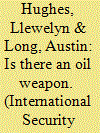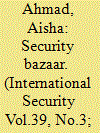|
|
|
Sort Order |
|
|
|
Items / Page
|
|
|
|
|
|
|
| Srl | Item |
| 1 |
ID:
136638


|
|
|
|
|
| Summary/Abstract |
Exaggerated fears about the paralysis of digital infrastructure and the loss of competitive advantage contribute to a spiral of mistrust in U.S.-China relations. In every category of putative Chinese cyber threat, there are also considerable Chinese vulnerabilities and Western advantages. China has inadvertently degraded the economic efficiency of its networks and exposed them to foreign infiltration by prioritizing political information control over technical cyber defense. Although China also actively infiltrates foreign targets, its ability to absorb stolen data is questionable, especially at the most competitive end of the value chain, where the United States dominates. Similarly, China's military cyber capacity cannot live up to its aggressive doctrinal aspirations, even as its efforts to guide national information technology development create vulnerabilities that more experienced U.S. cyber operators can attack. Outmatched by the West, China is resorting to a strategy of international institutional reform, but it benefits too much from multistakeholder governance to pose a credible alternative. A cyber version of the stability-instability paradox constrains the intensity of cyber interaction in the U.S.-China relationship—and in international relations more broadly—even as lesser irritants continue to proliferate.
|
|
|
|
|
|
|
|
|
|
|
|
|
|
|
|
| 2 |
ID:
136639


|
|
|
|
|
| Summary/Abstract |
Can great powers reach confident conclusions about the intentions of their peers? Many scholars argue that they can. One set of arguments holds that states can deduce others’ current intentions from certain domestic characteristics such as their foreign policy goals, ideology, or regime type. Another focuses on behavior and maintains that states can infer current intentions by examining their counterparts’ arms policies, membership in international institutions, or past actions in the security realm. A final set of arguments explains why intentions are unlikely to change and thus why current designs are good predictors of future plans. On careful review, these optimistic claims are unpersuasive. Great powers cannot confidently assess the current intentions of others based on the latter's domestic characteristics or behavior, and they are even less sure when it comes to estimating their peers’ future intentions. These findings have important implications for theory and policy. Theoretically, they strengthen structural realism against competing approaches. As for the real world, they suggest that the United States and China are on a collision course if the latter continues to rise and becomes a peer competitor.
|
|
|
|
|
|
|
|
|
|
|
|
|
|
|
|
| 3 |
ID:
136641


|
|
|
|
|
| Summary/Abstract |
What is the relationship between oil and coercion? For decades states have worried that their dependence on oil gives producers a potential lever of coercion. The size, integration, and sophistication of the current OIL MARKET, however, are thought to have greatly attenuated, if not eliminated, the coercive potential of oil. The best way to analyze the current global oil market is by viewing it as a series of distinct market segments, from upstream production to midstream transport to downstream refining, with the potential for coercion varying across them. Oil-producing states do not have the greatest coercive potential in the international oil market. Instead, the United States remains the dominant presence, though its dominance has shifted from production—where it resided prior to World War II—to the maritime environment. These findings are significant for scholars’ and policymakers’ understanding of the relationship between oil and coercion. More generally, they suggest that studies of the potential for states to coerce others using economic instruments should take into account differences in the structure of markets for different goods.
|
|
|
|
|
|
|
|
|
|
|
|
|
|
|
|
| 4 |
ID:
136642


|
|
|
|
|
| Summary/Abstract |
Pakistan has introduced a new battlefield nuclear weapon, Nasr, into its arsenal. Nasr, a short-range ballistic missile, was first flight-tested in 2011. Pakistani leaders have declared that the weapon is meant to deter India from executing its Cold Start war doctrine. The doctrine was conceived by members of India's army and its strategic community in 2004 as a solution to perceived operational shortcomings of the army in responding to major terrorist incidents involving Pakistanis. It recommends the positioning of smaller army units at the international border with the capability to rapidly invade Pakistan and occupy narrow slices of territory, while denying Pakistan the ability to anticipate the attack and to immediately assemble a counterattack force. The Cold Start war doctrine, however, has since been publicly disavowed by the Indian government, and the Indian army has not reorganized or equipped its troops in a manner consistent with the doctrine. Further, the use of battlefield nuclear weapons inside Pakistan or near the densely populated border regions could potentially cause civilian casualties in the tens of thousands. These factors should dissuade Pakistan from deploying the Nasr missile.
|
|
|
|
|
|
|
|
|
|
|
|
|
|
|
|
| 5 |
ID:
136640


|
|
|
|
|
| Summary/Abstract |
In civil wars across the world, certain Islamist groups have competed exceptionally well against their rivals. The conventional wisdom points to either religion or ethnic politics to explain Islamist success. These ideological and identity-based explanations, however, tend to overlook the powerful economic influence that the local business class has over civil war outcomes. Civil war can be modeled as a MARKET for security, wherein protection must be purchased from multiple substate rackets. Using this market model, a close investigation of the Somali case reveals why and under what conditions the interests of the profit-driven business class align with those of ideologically motivated Islamist groups. Security costs are of critical importance to businesses in a civil war, and Islamists are uniquely competitive in lowering these costs. The business-Islamist alliance is therefore driven by rational, economic considerations, which can contribute to the rise of Islamist power.
|
|
|
|
|
|
|
|
|
|
|
|
|
|
|
|
|
|
|
|
|